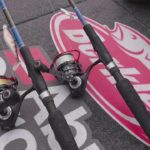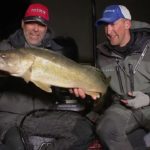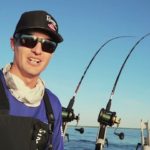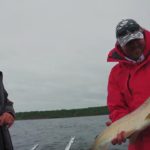So You Want to be a Pro Fisherman
This article originally appeared in The Walleye Insider.
 I bet I hear it a hundred times a year…”Boy would I like to have your life. Being a pro fisherman must be the best job in the world. All you have to do is fish all the time.” Granted, being able to make a living doing what I love to do is great, but being a professional walleye fisherman isn’t just about fishing tournaments a few months out of the year and taking the rest of the year off. What most people don’t seem to realize is that to make a living at this game is hard work, and to do it right means that there is no “off-season”.
I bet I hear it a hundred times a year…”Boy would I like to have your life. Being a pro fisherman must be the best job in the world. All you have to do is fish all the time.” Granted, being able to make a living doing what I love to do is great, but being a professional walleye fisherman isn’t just about fishing tournaments a few months out of the year and taking the rest of the year off. What most people don’t seem to realize is that to make a living at this game is hard work, and to do it right means that there is no “off-season”.
First of all let me define what it means to be a professional fisherman. Many anglers fish tournaments. Some even go so far as to make deals with various companies so they can get equipment and tackle for free or at reduced prices. But to be a professional…to be able to make a living and survive in the fishing game…takes money. You can win money by doing well on the tournament circuits, but even the hottest sticks on the trail rarely make enough money from tournaments to carry them through the winter. There are lots of ways to supplement your income as a pro fisherman. You can make money giving seminars in the winter months and sell articles and photographs to magazines. All that helps, but to truly survive as a professional fisherman means that you need to get sponsors that are willing to pay you a retainer in exchange for the work you do for that company. That’s a big step in the fishing industry, and it’s not an easy thing to do.
It’s not a “one win” situation anymore…you can’t just go out and win a major tournament and expect companies to fall all over themselves to give you money. It takes longevity, doing well over a period of time, so that the public gets to know who you are, you get written up in magazines or even get a guest shot on a TV program.
The work really begins when the tournament season ends. If October comes and you disappear until April, you are not going to survive in the fishing industry. Your job in the “off-season” is to get to know the people in the companies that will make the decisions on whether or not they are willing to sponsor you. Usually that will be someone in the marketing department. If you can work with these people, show them opportunities in the professional fishing game that will gain their company more exposure with the fishing public thus making their company more “popular” and increasing sales, then you have helped them a lot. That’s what these companies are looking for.
 Good quality photos that can be used in magazines articles and advertising are important. It can help a company a lot if they need a good “Trophy Shot” of a big fish with their lure hanging out of it’s mouth, or their logo on the angler’s cap and shirt to use in a print ad and you can supply that for them. The fall months (October and November) are great months for doing photos. Many bodies of water put out good numbers of big fish in the fall, and because of the colder water temperatures, the fish look better, and hold up better for lengthy photo shoots before being released. Investing the time and money in taking professional quality photos and shooting good video is an important part of the game. Good photos and video are also important if you are putting together a professional quality seminar to present at sport shows and fishing clubs during the winter. When it comes to doing a seminar, make it as “professional” a presentation as you can. That means using the best quality photography, video and equipment that you can afford. You want to keep yourself in the public eye during the “off-season”, and a professional quality seminar that you have put time and effort into will go a long way to helping you grow in the industry.
Good quality photos that can be used in magazines articles and advertising are important. It can help a company a lot if they need a good “Trophy Shot” of a big fish with their lure hanging out of it’s mouth, or their logo on the angler’s cap and shirt to use in a print ad and you can supply that for them. The fall months (October and November) are great months for doing photos. Many bodies of water put out good numbers of big fish in the fall, and because of the colder water temperatures, the fish look better, and hold up better for lengthy photo shoots before being released. Investing the time and money in taking professional quality photos and shooting good video is an important part of the game. Good photos and video are also important if you are putting together a professional quality seminar to present at sport shows and fishing clubs during the winter. When it comes to doing a seminar, make it as “professional” a presentation as you can. That means using the best quality photography, video and equipment that you can afford. You want to keep yourself in the public eye during the “off-season”, and a professional quality seminar that you have put time and effort into will go a long way to helping you grow in the industry.
From January through March it’s not hard to hit a major sport show every weekend. If you’ve done your leg-work over the summer, you can get booked to do seminars in some of them, but even if you aren’t speaking, make an effort to attend the bigger shows, introduce yourself to the show promoters and look up any “reps” that may be attending these shows. If you can impress a company’s rep, either by helping work the company’s booth at the show, or by putting on a good seminar, it’s a good bet that that rep will be a valuable ally when it comes to dealing with a company for sponsorship.
During this whole time you need to stay in contact with the companies you are working with. Let them know what you are doing, and more importantly, find out what their plans are for the upcoming year. Be aware of what new products they are looking to promote and work with them on what you can do to get the word out. This is where you, as a professional angler, can be a big help. You know what catches fish because you’ve spent the whole last season fishing with it. Let the company know that they have a hot product and how you can help promote it.
Another important step would be to become a member of the NPAA (National Professional Anglers Association). This is an organization dedicated to growing the sport of fishing, and involvement in the NPAA shows your sponsors that you’re serious about making a commitment to the sport and the industry.
Remember, there is no real “off-season” for the professional walleye fisherman. The time you spend not fishing, you need to spend getting to know the industry, how it works, and the people that make it tick. Conduct yourself as a “professional”, both on the tournament trail and in the so-called “off-season”. You are representing a great industry, and companies will be more apt to deal with you if they see you as a professional.





